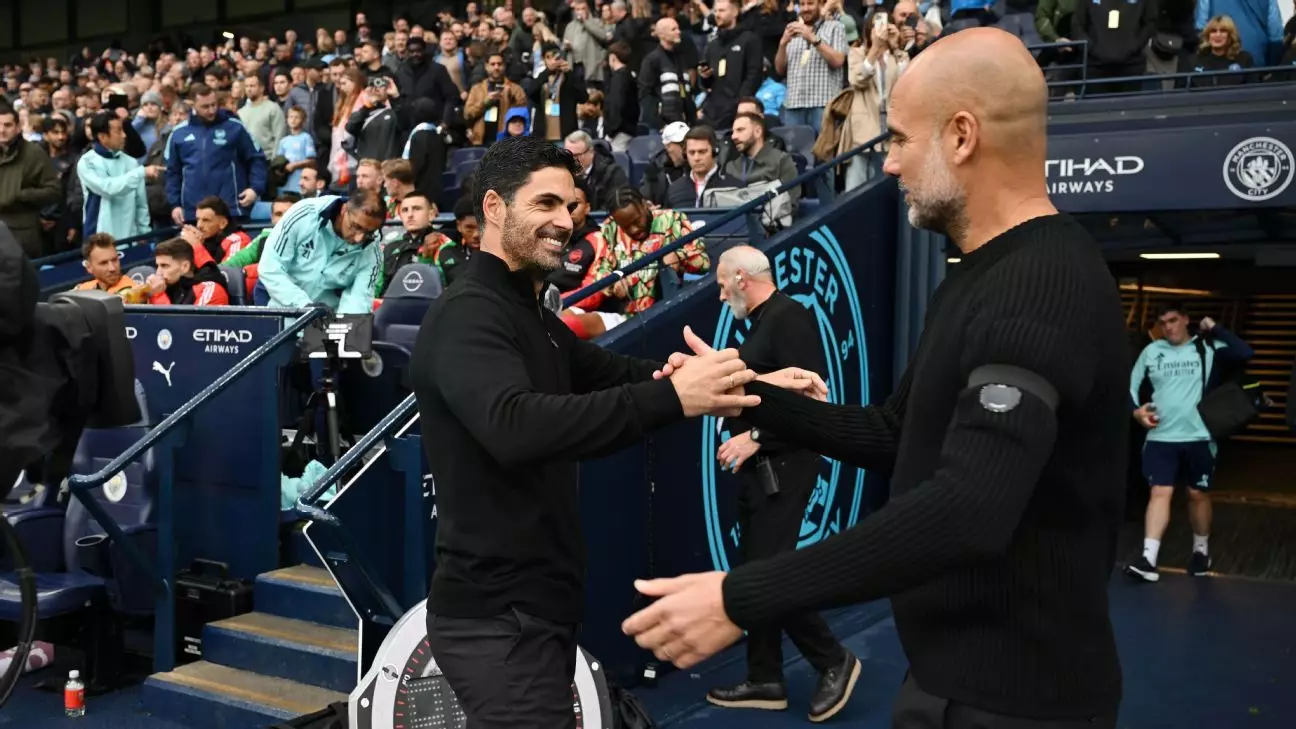In the high-stakes world of football, rivalries are commonplace, but the relationship between managers can often transcend the competitive nature of the sport. Mikel Arteta, manager of Arsenal, has recently faced scrutiny due to his team’s tactical choices in a heated match against Manchester City, where he formerly served as an assistant coach under Pep Guardiola. Despite the intensity of the Premier League title race, Arteta maintains that his friendship with Guardiola remains unscathed. This assertion sheds light on the complexities of personal relationships in professional environments, particularly when competitive emotions run high.
Arteta’s comments emerged in the wake of a gripping 2-2 draw between Arsenal and City, a match that saw Arsenal adopt a defensive strategy following a red card that sidelined forward Leandro Trossard. The end of the match was marked by visible tensions among City players, who expressed dissatisfaction with Arsenal’s approach. Such incidents underline the pressures faced by teams competing at the highest levels, where the thin line between rivalry and camaraderie can easily blur.
The Power of Respect in Competition
Arteta, who took the helm at Arsenal in 2019, emphasized the fundamental dichotomy between personal relationships and professional obligations. In a recent press conference, he articulated his deep admiration for Guardiola, stating, “I love him, I respect him, I admire him and I admire his team and everything that he does.” His words resonate as a reminder that competition does not diminish the respect or admiration one may hold for a fellow professional.
This perspective is crucial in an environment where emotions can dictate actions. Arteta asserts that personal ties should not be dictated by the outcomes of matches. “If our relationship was damaged because one draws and the other one wins…I would not talk to him any more,” he stated, highlighting a mature approach to maintaining personal connections amidst professional rivalries. This attitude serves as a model for athletes and coaches alike, emphasizing that mutual respect should prevail over competition-related animosity.
As Arsenal prepares for their upcoming match against Leicester City, Arteta’s focus extends beyond his personal relationships. The health and fitness of his squad are paramount. Players Jurriën Timber and Ben White have been reported fit to play, while new signing Mikel Merino shows promise in his return from injury. His recovery is particularly noteworthy, given that he sustained a serious shoulder injury during his first training session after signing a significant €37.5 million deal.
Arteta’s comments regarding Merino’s progress illustrate a careful and strategic approach to player management. “We are trying to keep him in the cage,” he said, referring to the need to balance his eagerness to return with the necessity of ensuring a full recovery before reintroducing him to competitive match conditions. This thoughtful consideration mirrors the broader ethos of the team under Arteta’s leadership: prioritizing both the physical and mental wellbeing of players as part of a holistic approach to competitive success.
The pressures faced by managers during a title race can lead to heated exchanges and internal conflicts, not only within teams but also among coaching staff. Arteta’s acknowledgment of this reality suggests an awareness of the challenges ahead, particularly in an environment as competitive as the Premier League. The balance of maintaining competitive edge while fostering a positive team culture is a delicate one.
David Raya, Arsenal’s goalkeeper, has been highlighted as a potential absentee for the Leicester match, which further complicates Arsenal’s preparations. Arteta’s pragmatic approach—”It’s not risk, it is about a player being fit or available or not”—indicates a level-headedness in addressing potential challenges.
Ultimately, Arteta’s approach signifies a broader message about the nature of sportsmanship and the bonds that can stand the test of competitive rivalry. While every match carries significant weight and emotions can run high, the ability to compartmentalize professional obligations from personal relationships can lead to healthier dynamics within the sport.
As the title race escalates and the pressure mounts, the true measure of a leader lies not just in tactical decisions on the pitch but in maintaining the integrity of their relationships off it. In this ever-evolving dance of competition and camaraderie, Mikel Arteta and Pep Guardiola exemplify the notion that respect and friendship can flourish, even amidst the fiercest of rivalries.

